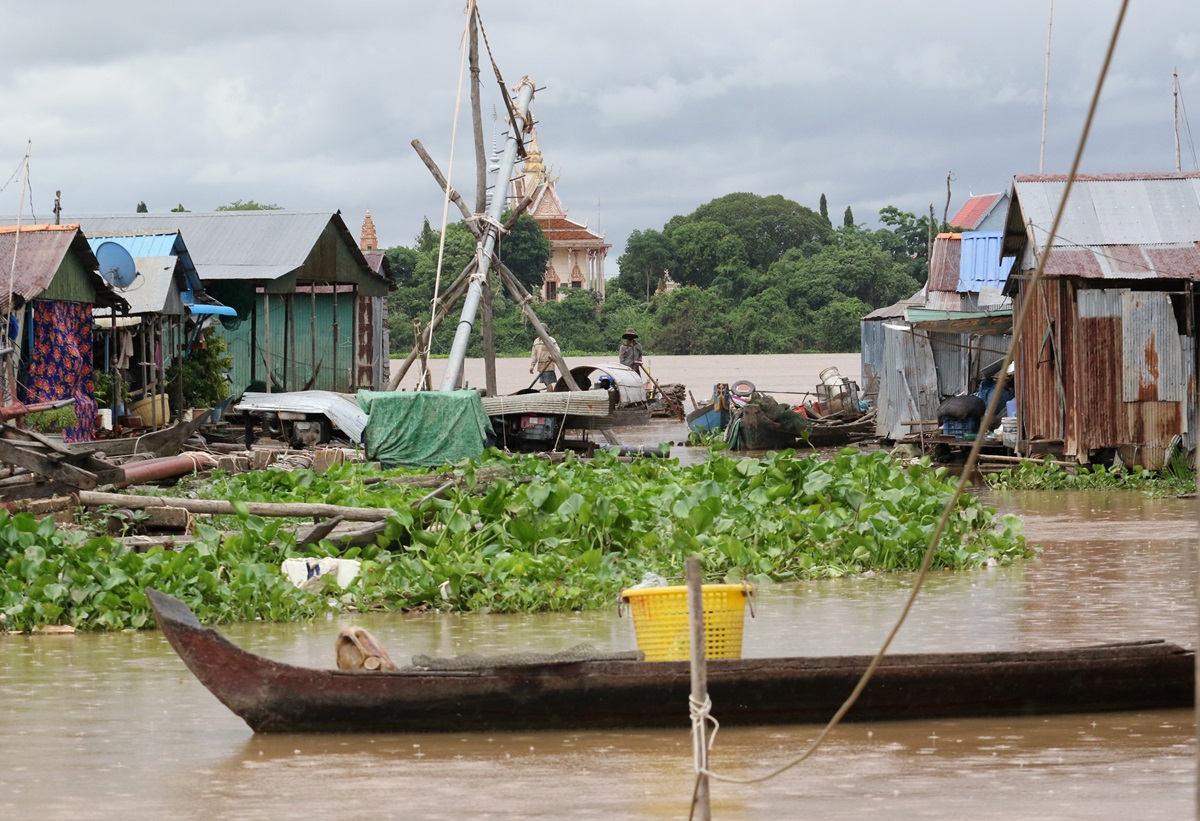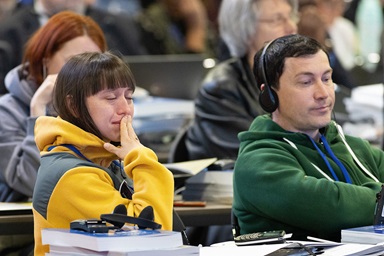A floating village that is home to “boat people” who fled Vietnam vividly illustrated for a United Methodist group the economic hardships that have made Cambodia one of the worst countries for human trafficking.
“I have learned that human trafficking is a more complex issue than I originally understood and has many forms and root causes. Many people know of the risk of human trafficking in Cambodia, but due to great financial hardship, they are willing to take the risk of relocating and starting a new job that could potentially lead them to becoming a victim of human trafficking,” said Josh Perry, a member of First United Methodist Church in Flushing, a section of Queens in New York.
He was part of the Cambodia Human Trafficking Consultation Mission Team, which included six Korean American United Methodists and seven staff members from the United Methodist Board of Global Ministries.
Cambodia is ranked ninth out of 167 countries in prevalence of human trafficking, with an estimated 261,000 people living in slavery, according to the Global Slavery Index.
The purpose of the mission team was “to provide an opportunity to dream dreams and vision; to see, feel and experience the work that can be done surrounding the issue of human trafficking and global migration,” said the Rev. Paul Kong, Asia Pacific Regional Representative of Global Ministries. Kong organized and led the trip.
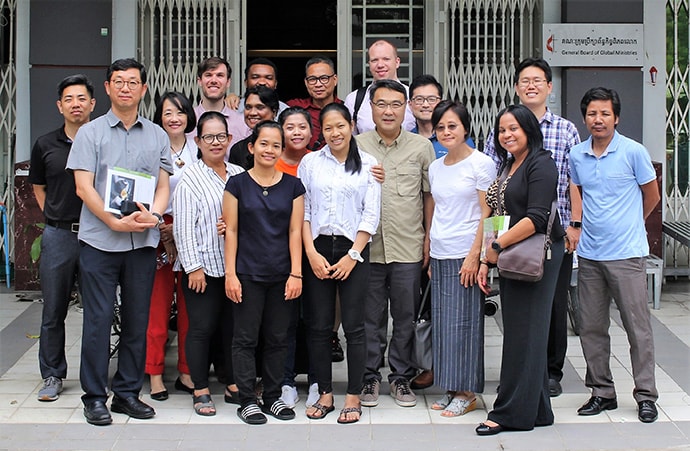
Members of the Cambodia Human Trafficking Consultation Mission team gather in front of the United Methodist Board of Global Ministries office in Phnom Penh. The team included six Korean American United Methodists and seven staff members from Global Ministries. Photo by the Rev. Thomas Kim, UM News.
Soila Vincent, an immigrant from Haiti and Global Ministries staff member in Atlanta, Georgia, said the sight of a little girl playing alone, dancing and laughing, reminded her of Haiti.
“As we were at the floating village church, and as I was looking at her, a fire inside of me begun to burn,” she said. “All types of ideas started to race in my brain, as to how we could fix this, or do something, and I felt that there should be an answer, and one that is not that hard to accomplish.”
Cambodia is located in Southeast Asia and shares borders with Thailand, Laos and Vietnam.
The country of 16 million people is a source, transit and destination country for men, women, and children subjected to forced labor, forced marriage and sex trafficking, according to report of the Asia Pacific Regional Office of the Board of Global Ministries.
“Cambodian adults migrate not only to regional neighbors of Malaysia, Thailand and China but increasingly to the Middle East in search for higher-paying jobs,” the report said.
Adam Shaw, a staff member for Global Ministries, researched human trafficking in Cambodia before the mission trip.
“Victims of human trafficking come from all of Cambodia’s 25 provinces,” he said. “Sex trafficking happens underground with Cambodian and ethnic Vietnamese women and girls moving from rural areas to cities subject to sexual exploitation at karaoke bars, salons, massage parlors, beer gardens,” Shaw said. He said rural women are recruited to go to China, where they expect marriage with a Chinese national, but are often sold and resold to the highest bidder and forced into multiple forced marriages and sexual exploitation.
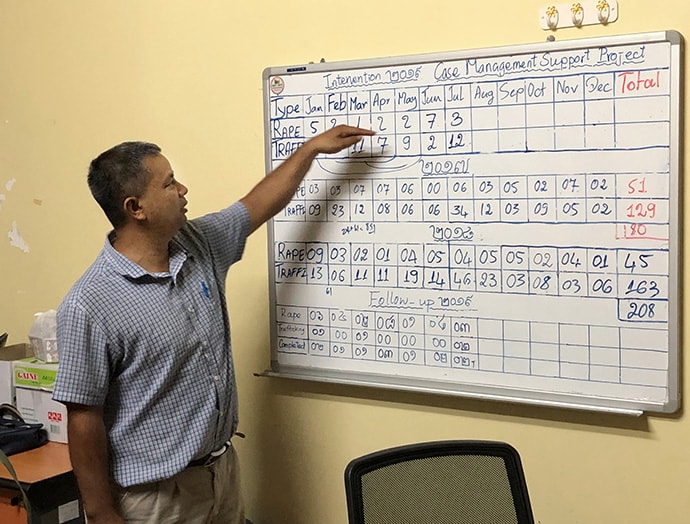
A staff member from the Chab Dai nongovernmental organization in Phnom Penh details the organization’s work with survivors of human trafficking in Cambodia and throughout Southeast Asia. Chab Dai means “holding hands” in the Khmer language. Photo by the Rev. Thomas Kim, UM News.
“We have heard, seen and felt the need as we took time to be here in Phnom Penh, Cambodia,” Kong said.
“All participants have a greater desire to combat the issue of human trafficking. Even though the church is currently going through a difficult process, we can all agree on something, which is fighting the good fight against the evil of human trafficking,” Kong added.
The mission team visited the Cambodia office of Global Ministries and various non-governmental organizations fighting human trafficking. The team also learned about ministries for victims, saw the red light district as well as the floating village, and discussed mission plans for the future.
Kim praised the leadership of the Asia Pacific Regional representative of Global Ministries.
“We are here to find a way of healing. The Asia office of GBGM could organize a big mission project that a local church could not do because of connectionalism, and that is one of the most outstanding strengths of The United Methodist Church as a denomination,” Kim said. “We Christians can overcome barriers of race and nationality as followers of Jesus Christ making disciples of Jesus, alleviating human suffering with one mind and spirit as United Methodists.”
Now the Asia Pacific Regional Office is working on Project ARK (Advancing Responsible Khmer), a program for the survivors of human trafficking. Since the roots of human trafficking are economic, the project will provide survivors an opportunity to better themselves. The project will train survivors in construction skills, which they will use to provide quality, affordable homes.
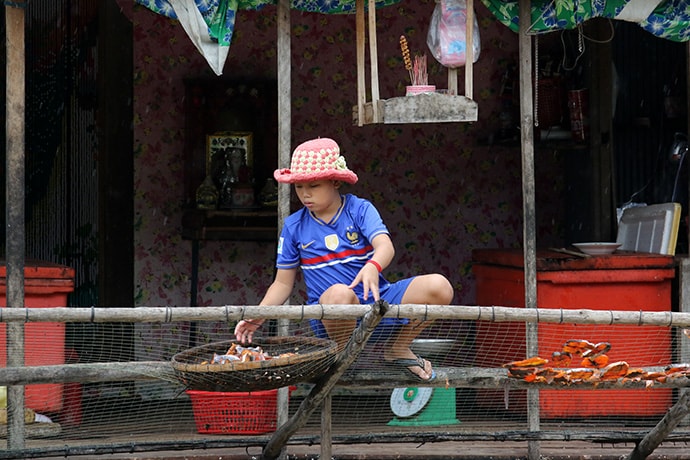
A young girl spreads fish to dry outside her family’s home in a floating village on the Tonle Sap River near Phnom Penh, Cambodia. The United Methodist Board of Global Ministries is planning a program, called Advancing Responsible Khmer, to help prevent human trafficking and to help its survivors feed themselves, educate their children, and afford family homes. Photo by the Rev. Thomas Kim, UM News.
The late Republic of Korea President Kim Dae-jung once said that, “Rice is a human right.”
Subscribe to our
e-newsletter
Like what you're reading and want to see more? Sign up for our free daily and weekly digests of important news and events in the life of The United Methodist Church.
During the visit to the floating village, the Rev. Luke Park, of Morningside United Methodist Church in New York City, prayed for Agape Floating Garden Church before the group left.
"Dear gracious God, we thank you for leading us to witness this floating village, where your heart and passion lies. We thank you for this opportunity to pray for the people in this place, and the pastor and his wife and family. We pray for your wonderful healing and power on these people who are struggling, hurt, and wounded in so many different ways as you also came for the poor, the sick and the captives,” Park led the group in prayer while they were on a boat in front of the church.
Kim is the Korean news editor for UM News. Contact him at 615-742-5470 or newsdesk@umnews.org. To read more United Methodist news, subscribe to the free Daily or Weekly Digests.
Like what you're reading? Support the ministry of UM News! Your support ensures the latest denominational news, dynamic stories and informative articles will continue to connect our global community. Make a tax-deductible donation at ResourceUMC.org/GiveUMCom.

